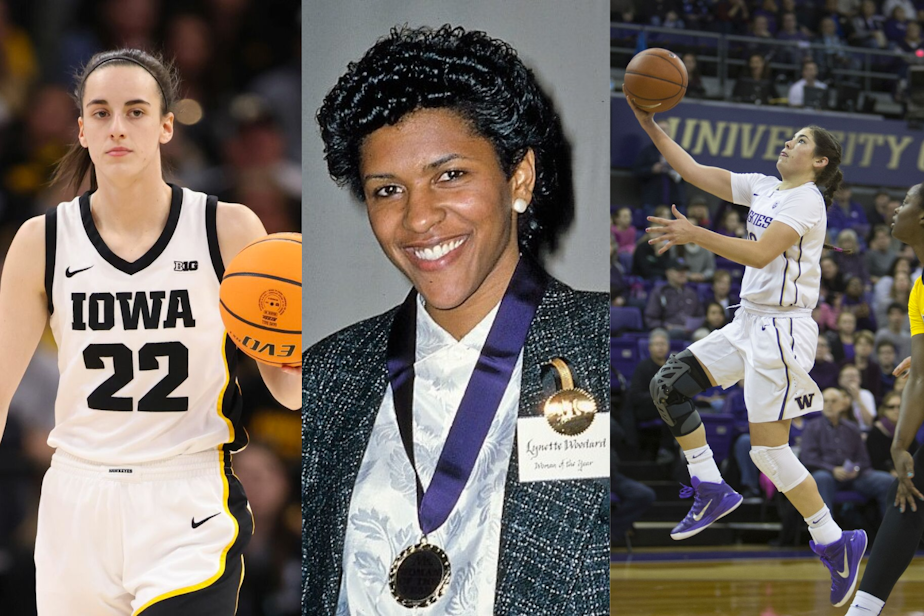A major UW sports record* is about to fall. Why the asterisk?

The stage is set for a record-breaking week in college sports. Barring an injury or other unforeseen event, Caitlin Clark will likely put up her 3,528th career point as an Iowa Hawkeyes basketball player on Thursday, passing the University of Washington’s Kelsey Plum’s all-time NCAA scoring record. But there's an issue with calling that a “record.”
This interview has been edited for clarity.
To dig into that backstory, KUOW’s Kim Malcolm reached out to Rachel Bachman, the Wall Street Journal's senior sports reporter. She's the author of a recent piece titled “Caitlin Clark’s NCAA Scoring Record Will Have an Asterisk: College basketball’s biggest star will be feted when she sets a new NCAA scoring mark, but many in women’s basketball believe a different record should count."
Kim Malcolm: No shade on Caitlin Clark or Kelsey Plum intended here. They're both amazing players. But to start, I want to hear about this key figure in your story, Lynette Woodard. Who is she and what did she accomplish?
Rachel Bachman: Lynette was a star at the University of Kansas in the late 70s and early 80s. She scored 3,649 points over her four seasons, which is still more than any other player in women's college basketball history.
She was playing before the three-point shot got started, right? Tell us a little bit about how good she was.
Sponsored
Well, not only was she a star in college, but she was a two-time Olympian, she won the gold at the ‘84 games, and she was the first female Harlem Globetrotter. Her accomplishments were so great, she ended up in the Naismith Basketball Hall of Fame.
And yet, her record is not recognized by the NCAA. Why is that?
That's because the NCAA did not start overseeing women's college sports until 1981. Lynette Woodard played under a previous governing body, which was only for women's sports.
And the NCAA does not include those stats when they're taking their records into account?
Generally, a player has to have played a majority of her seasons in the NCAA, so it does not include records from this women's college sports governing body.
Sponsored
Title IX came into effect in that era, to help ensure that women's college sports got the resources they deserved, and hopefully recognition as well. Would that not have helped athletes like Woodard?
It would have helped them if schools actually had complied with it, but many of them fought doing so.
So what is the NCAA saying now as Caitlin Clark is steamrolling toward this record? What do they say about who's ranking where?
Well, the NCAA really wouldn't answer the question of whether it would consider integrating these older statistics into the all-time records lists. It's not clear whether they might consider doing so in the future.
I should point out, there is some precedent for this in other leagues. Major League Baseball recently decided to integrate records from Negro Leagues into baseball records to acknowledge the history of Major League Baseball excluding Black players.
Sponsored
You also spoke with Lynette Woodard. What did she have to say about this?
She really was sort of resigned when I spoke with her. She, I think, has fought this battle for years, of feeling like she should be better recognized. She just thinks that people should pay better attention to women's sports history.
She's a huge fan of Caitlin Clark. She called her an awesome player. She said what she's doing is great for the game, that women's basketball interest is at an all-time high, and bring it on.
Listen to the interview by clicking the play button above.
Hear the full interview below.





